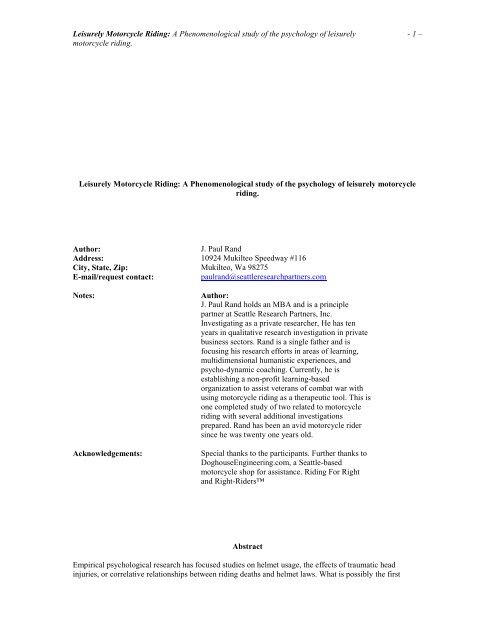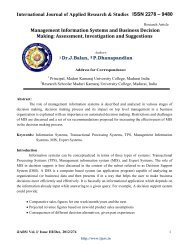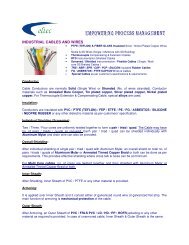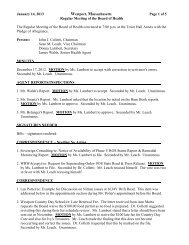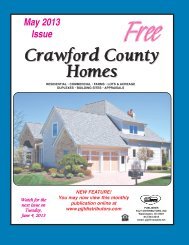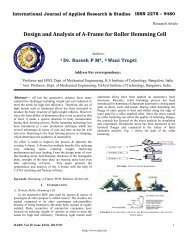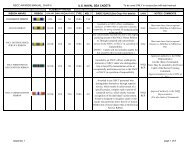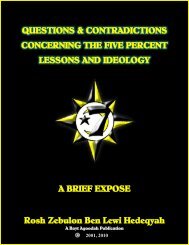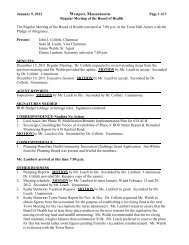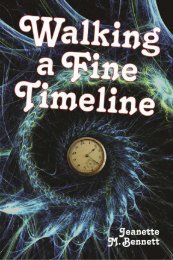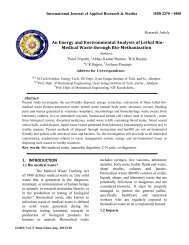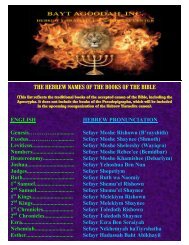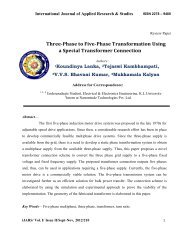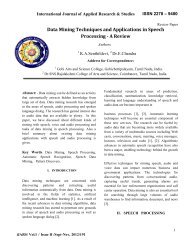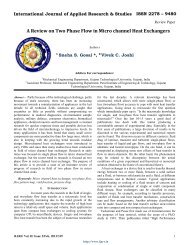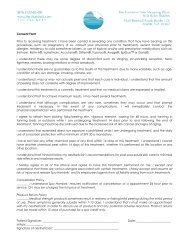Leisurely Motorcycle Riding - Hgsitebuilder.com hgsitebuilder
Leisurely Motorcycle Riding - Hgsitebuilder.com hgsitebuilder
Leisurely Motorcycle Riding - Hgsitebuilder.com hgsitebuilder
Create successful ePaper yourself
Turn your PDF publications into a flip-book with our unique Google optimized e-Paper software.
<strong>Leisurely</strong> <strong>Motorcycle</strong> <strong>Riding</strong>: A Phenomenological study of the psychology of leisurely - 1 –<br />
motorcycle riding.<br />
<strong>Leisurely</strong> <strong>Motorcycle</strong> <strong>Riding</strong>: A Phenomenological study of the psychology of leisurely motorcycle<br />
riding.<br />
Author:<br />
J. Paul Rand<br />
Address: 10924 Mukilteo Speedway #116<br />
City, State, Zip: Mukilteo, Wa 98275<br />
E-mail/request contact:<br />
paulrand@seattleresearchpartners.<strong>com</strong><br />
Notes:<br />
Acknowledgements:<br />
Author:<br />
J. Paul Rand holds an MBA and is a principle<br />
partner at Seattle Research Partners, Inc.<br />
Investigating as a private researcher, He has ten<br />
years in qualitative research investigation in private<br />
business sectors. Rand is a single father and is<br />
focusing his research efforts in areas of learning,<br />
multidimensional humanistic experiences, and<br />
psycho-dynamic coaching. Currently, he is<br />
establishing a non-profit learning-based<br />
organization to assist veterans of <strong>com</strong>bat war with<br />
using motorcycle riding as a therapeutic tool. This is<br />
one <strong>com</strong>pleted study of two related to motorcycle<br />
riding with several additional investigations<br />
prepared. Rand has been an avid motorcycle rider<br />
since he was twenty one years old.<br />
Special thanks to the participants. Further thanks to<br />
DoghouseEngineering.<strong>com</strong>, a Seattle-based<br />
motorcycle shop for assistance. <strong>Riding</strong> For Right<br />
and Right-Riders<br />
Abstract<br />
Empirical psychological research has focused studies on helmet usage, the effects of traumatic head<br />
injuries, or correlative relationships between riding deaths and helmet laws. What is possibly the first
<strong>Leisurely</strong> <strong>Motorcycle</strong> <strong>Riding</strong>: A Phenomenological study of the psychology of leisurely - 2 –<br />
motorcycle riding.<br />
empirically-based investigation of the psychology of leisurely motorcycle riding; this study establishes a<br />
new focus on motorcycle riding. It is rooted in understanding a framework of psychological themes<br />
experienced during leisurely riding using a transcendental-phenomenological method. The leisurely riding<br />
experience is understood through rich dialogue. The universal themes are analyzed using <strong>com</strong>mon domains<br />
of psychology. The analysis provides a new understanding of the psychology of motorcycle riding. The<br />
final results open avenues for future investigation, such areas as therapeutic riding; reduction of PTSD<br />
symptoms, and cognitive/personality traits of riders.<br />
Key Words: <strong>Motorcycle</strong>; psychology; leisure<br />
Table of Contents omitted per journal instructions.
<strong>Leisurely</strong> <strong>Motorcycle</strong> <strong>Riding</strong>: A Phenomenological study of the psychology of leisurely - 3 –<br />
motorcycle riding.<br />
Introduction<br />
The Journal of <strong>Motorcycle</strong> studies provides one heuristic publication of the influence of<br />
motorcycling and sociology in a learning program. Additionally, there are limited studies examining the<br />
sociological constraints of leisurely participation and motorcycle riding (Auster, 2001). Heuristic<br />
understandings are beneficial to psychology (Gigerenzer, 1991; Creswell, 1998; Patton, 2003). However,<br />
beyond non-empirical heuristic publications there is an absence of empirical understanding of the<br />
psychology of motorcycle riding as a leisure activity.<br />
<strong>Motorcycle</strong> riding is defined loosely in academia as a leisure activity. On the <strong>com</strong>mercial front, it<br />
is marketed as a way of life (Strutter, 2010). The field of psychology has focused empirical studies on<br />
helmet usage, the effects of traumatic head injuries, and/or correlative relationships between riding deaths<br />
and helmet laws (see Lin, Tsauo, Hwang, Chen, Tsai, & Chiu, 2004; Houston & Richardson, 2007;<br />
Mertz & Weiss, 2008). This study seeks to establish a new dimension of understanding motorcycle riding.<br />
Given the lack of available empirical knowledge this study is rooted in understanding the psychological<br />
themes of leisurely riding through a phenomenological process.<br />
Qualitative Objectives<br />
This study contributes a new understanding of the individual psychological experience as<br />
experienced by cruiser (non-street bikes) riders. Phenomenological studies capture an understanding of<br />
shared human experiences (Creswell, 2003). Understanding general psychological themes of riding<br />
experience may open the door for further investigation. Such information may help researchers, clinicians,<br />
and others better understand motorcycle riders.<br />
The key terms for this study are leisurely and motorcycle. <strong>Motorcycle</strong>-riding is rather selfexplanatory;<br />
however, the sample group, and thus term, would be limited to non-<strong>com</strong>muting riding on<br />
cruisers. Cruisers are most <strong>com</strong>monly associated with Harleys. However, there are other brands of cruisers,<br />
all of which have been accepted in this study. Street bikes, such as Ducati, were not included with this<br />
specific study.<br />
The reference to non-<strong>com</strong>muter is necessary to capture the leisurely aspect of riding (see Methods<br />
section for further clarification). Every-day riding experiences ought to be subject of a different study.
<strong>Leisurely</strong> <strong>Motorcycle</strong> <strong>Riding</strong>: A Phenomenological study of the psychology of leisurely - 4 –<br />
motorcycle riding.<br />
However, this is not to say riders who <strong>com</strong>mute to work have been excluded. Instead, this investigation<br />
focuses on understanding leisurely riding.<br />
Leisure<br />
Leisure has be<strong>com</strong>e recognized as a method to control and over<strong>com</strong>e traumatic emotional<br />
experiences (Iwasaki, MacKay, MacTavish, Ristock, & Bartlett 2006; Schneider & WilhelmStanis, 2007)<br />
including stressors associated with negative life events (Hutchinson, Loy, Kleiber, & Dattilo, 2002).<br />
Leisure lifestyle can relate the marketing of riding as a lifestyle in that it includes activities people express<br />
themselves through (Arai, Griffin, Miatello, Greig, 2008). Leisure additionally has been described as<br />
pleasant experiences intrinsically motivated and often optional, autonomous, and self-involving (Hood &<br />
Carruthers, 2007).<br />
The nature of riding, however, presents both autonomous and group participation in simultaneous<br />
situations. Decloe, Kaczynski, and Havitz (2009) report in one investigation that approximately 1/3 of<br />
participants studied engaged in leisurely activity alone. While riding is a process between one individual<br />
and a mechanized vehicle, there is the opportunity for passengers and group rides as well. Therefore,<br />
questions asked related to participants‟ descriptions of what their leisurely riding experience helps provide<br />
an understanding if psychological domains of leisure riding tend to be autonomous, group, or a<br />
<strong>com</strong>bination thereof.<br />
Studies examining motivations, or need, theories for leisure are based upon five <strong>com</strong>mon themes.<br />
“Classical theories basically center around five main explanations: catharsis, <strong>com</strong>pensation, surplus energy,<br />
relaxation and task generalization. Each of these theories purports to predict or explain motivation for<br />
leisure behavior,” (Witt & Bishop, 2009, p. 337). Witt and Bishop focused on highlighting motivations for<br />
seeking leisurely experiences. However, motorcycle riding does not appear easily associated with their<br />
descriptions. Therefore, establishing an understanding for motivation to ride was a foundational question in<br />
this investigation to better relate to these established findings.<br />
Furthermore, the expression and performance of individuals has been a well documented aspect of<br />
physical leisurely experiences. Jackson and Eklund (2002) describe situations of optimal physical<br />
performance, or flow, as "those moments when everything <strong>com</strong>es together for the performer" (p. 133).<br />
Such experiences are documented to enhance self-esteem and continued participation (Stein, Kimiecik,
<strong>Leisurely</strong> <strong>Motorcycle</strong> <strong>Riding</strong>: A Phenomenological study of the psychology of leisurely - 5 –<br />
motorcycle riding.<br />
Daniels, & Jackson, 1995). Questions for this study were built with the objective of encouraging dialouge<br />
related to self-reflection or awareness that occurs when riding to better understand the relationship to<br />
leisurely experiences. To this end, a naturalistic approach in the interview process was developed around<br />
the following description of leisure: a pleasant, motivated and physical activity fostering self-reflection or<br />
self-achievement through autonomous or group expierences.<br />
Methodological Summary<br />
The roots of research methods can be traced to the debates of ancient philosophers such as<br />
Aristotle and Socrates. Empiricists, such as Aristotle and more recently Locke, believed that understanding<br />
could only be obtained through strict observation and perception of events (Hunt, 2008). On the other hand,<br />
philosophers such as Socrates and Descartes‟ believed that through rational logical inquiry could the mind<br />
and world be understood (Sternberg, 2009). There are benefits and weakness to each. Ultimately, Kant<br />
recognized that each method has its purpose at certain times and in certain conditions. While a debate<br />
continues as to which process is better – the development of theory through qualitative method, or the<br />
empirical testing to determine accuracy of hypothesis to develop theory – they both serve as effective tools<br />
in psychology. The following section recognizes the un<strong>com</strong>mon use of qualitative inquiry in psychology;<br />
therefore, more substantive explanation is provided regarding the methodological process for opportunity<br />
for replication of the study by others less familiar with qualitative methods.<br />
Methodological description<br />
In qualitative methods, substantial data is collected through observation, survey questions,<br />
researcher experience (heuristic design), and/or participant interviews (Creswell, 1998). The objective of<br />
phenomenological research is to capture and/or observe human experiences using thick, rich, and<br />
descriptive accounts provided by individuals having lived through such events (Creswell, 2003). This<br />
study establishes a preliminary understanding of the core experience of leisurely motorcycle riding and is<br />
follows principles of maximum variation (see Patton, 2003).<br />
Transcendental studies, defined by Moustakas (1994), take a three-part approach to understanding<br />
human phenomenon. This structure follows a rigid pattern through epoch, transcendentalphenomenological<br />
reduction and imaginative variation to capture an understanding of the how and what of<br />
a specific human experience. To this end, participants have been selected based on ownership and use of
<strong>Leisurely</strong> <strong>Motorcycle</strong> <strong>Riding</strong>: A Phenomenological study of the psychology of leisurely - 6 –<br />
motorcycle riding.<br />
cruiser motorcycle riding through personal and professional networking. Moreover, participant testimonies<br />
prior to analysis provide the thick and rich basis for understanding the phenomenon under investigation.<br />
Study Process<br />
Participants volunteered or re<strong>com</strong>mend someone who might be interested in this study. Creswell<br />
(2003) indicates that sample groups for a phenomenological study can range from 6 to 10 participants.<br />
Lincoln and Guba (1985) argue that a point of redundancy (saturation) is an ideal target for researchers to<br />
select sample size. Six participants contributed to this study over a four month period. One-on-one<br />
interviews and journal/written entries provide the descriptions. Redundancy was identified using axial and<br />
spatial thematic coding of testimonies. An observation of half of the participants, while riding, was<br />
conducted by the researcher furthering understanding.<br />
Data was collected using short interviews with participants using a naturalistic inquiry process<br />
(e.g. Lincoln & Guba, 1985). Sub-questions ensured proper dialogue, but the naturalistic approach focused<br />
on understanding each unique rider versus a general qualitative questioning processes. Some participants<br />
provided written reflections to help develop understanding between oral, written reflections, and<br />
observation. Because the subjective nature of leisurely activities reduces the ability for observation of the<br />
participants, limited emphasis is placed on observed findings.<br />
Through this process tentative core qualities are presented. A textural process occurs where an<br />
illustration is portrayed without the essence of the actual experience (Patton, 2003). This creates a<br />
synergistic <strong>com</strong>bination of the data. Interpretation of the experiences occurs by merging oral and written<br />
testimonies based on coded core qualities. In a few instances this is supported with textural <strong>com</strong>ments from<br />
literary arts.<br />
Minor literary references are incorporated into the thematic coding process. Polkinghorne (1989)<br />
indicates that information from literary or artistic experiential situations can provide value in a<br />
phenomenological study. This information serves as a guide to creating a relationship between themes in<br />
literature and emerging experience described by participants. This provides a natural link between the<br />
experiences of actual riders with the descriptions found in literary arts and non-psychological studies.<br />
Psychological domains link core qualities through the analytical process. The first step of analysis<br />
in a phenomenological analysis is epoch (Patton, 2003). This is an on-going analytical process requiring the
<strong>Leisurely</strong> <strong>Motorcycle</strong> <strong>Riding</strong>: A Phenomenological study of the psychology of leisurely - 7 –<br />
motorcycle riding.<br />
investigator to consider the material without bias. A heuristic bracketing of the researchers intense<br />
experience with the phenomenon was <strong>com</strong>pleted to respect this process (omitted from this publication).<br />
The second step is equal value analysis; or, horizontal analysis. Recurring themes are describe<br />
based on how and what disciplines psychology help create a relationship between the themes. This is<br />
consistent with Douglass‟ description of identifying invariant themes (see Patton, 2003). The final result of<br />
the analysis is a more specific understanding of the psychological domains of leisurely riding experiences.<br />
In the final section, the study is evaluated in relationship to leisure studies and methodological<br />
improvements and new opportunities for empirical study. It is important to remember the<br />
phenomenological studies provide high-level understanding to be used as frame-work for more specific<br />
qualitative and quantitative investigation. Consequently, broad psychological disciplines are applied to the<br />
testimonies.<br />
Findings<br />
This section identifies key qualities discovered through the phenomenological process. Namely,<br />
core qualities of the riding experience will be established. This information is synthesized into general<br />
psychological themes in the next section before the concluding evaluation of the study. Core qualities<br />
provide universal structure that defines an experience (see Mustakas, 1994). Therefore, the following<br />
general qualities are listed regarding the <strong>com</strong>mon characteristics of leisurely riding: Sound of the pipes,<br />
<strong>com</strong>munity, and loss of thoughts, union of mechanized bike and rider, destination, heightened sensory<br />
awareness, relaxation/problem resolution, and the “feeling.”<br />
Sound of pipes<br />
<strong>Motorcycle</strong>s are notorious for the noise and sounds made by pipes. The participants <strong>com</strong>monly<br />
noted this in their assessment of leisurely riding experiences. John L. (age 29; fire-fighter; custom bike<br />
shop owner) states the most memorable aspect of wanting to learn to ride was “how loud and amazing the<br />
pipes sounded.” While Chris L. (age 30; salesman; lifelong rider) describes the impact of pipes as<br />
influential to “feeling the sound, the thunder, the power… [of the ride].” Andy S. (32; doctoral learner in<br />
education) notes how “…Its exciting… there is definitely a relationship between the noise [and riding].”<br />
Chris C. (29; Ex-<strong>com</strong>bat Veteran; sales professional) describes how “once the bike is started I enjoy<br />
listening to the motor warm up and the pipes open up… [at times I] accelerate hard a few times just to hear
<strong>Leisurely</strong> <strong>Motorcycle</strong> <strong>Riding</strong>: A Phenomenological study of the psychology of leisurely - 8 –<br />
motorcycle riding.<br />
the motor…” The sound of the pipes is considered further in relationship to physiological section of the<br />
analysis.<br />
Commitment<br />
Bikers have a strong sense of connection with their bikes. Commitment is expressed in various<br />
forms. Neil N. (32; real estate IT manager; new rider) describes riding as “a dream <strong>com</strong>e true…I go out on<br />
my bike every chance I have.” For John L. riding involves a mechanical relationship with his bike, too. “At<br />
the end of the day, I just love it. I would never give my bike up,” says Chris L. “I tell my wife every week<br />
„I love my bike‟…There is no way I will give up my bike…” says Andy S.<br />
The <strong>com</strong>mitment to the riding experience in the testimonies gives way to the actual experience of<br />
riding. “There was a time a few years ago where I was without a bike for the first time since in was 15. I<br />
really didn‟t think I missed it… when I purchased another one and after my first ride I was really surprised<br />
how much I missed it and what it did for me,” writes Jimmy N. (+40; Electrical Engineer/PM; multiple<br />
Harley owner). In other words, riders feel a sense of belonging not only to their unique personal desires to<br />
ride but also to the machine they chose to operate. This quality is related to the next frequently saturated<br />
theme of the leisurely riding experience.<br />
Union of mechanized bike and rider -<br />
“The <strong>com</strong>mon part of every ride is that it is you and the bike… It‟s just you and that machine,”<br />
Chris L. While Neil N. describes a leisurely ride as process “almost be<strong>com</strong>ing one with the bike and events<br />
around you, you respond naturally [together]… There is no detaching yourself, your fully engulfed in<br />
keeping the rubber-side of the bike down.” It goes deeper, however, the connection: “it‟s the mechanical<br />
aspect of feeling and fixing and knowing your bike….” states John L.<br />
Chris L. further describes, before you be<strong>com</strong>e one with the machine, “you feel her out – am I<br />
pushing her to ride Is she easing into the ride Is she running rich Before you know it, it is as though you<br />
and the machine are one. There are no more questions, just one sense of being.” Or as Andy describes the<br />
experience, “…when I go around windy turns I feel one with it, but when your really leaning into a turn<br />
and hugging that bike you feel one not like your just riding something…you feel, see, and hear all at the<br />
same time - that can not be created by anything but being on that bike.” Jimmy N. further clarifies the
<strong>Leisurely</strong> <strong>Motorcycle</strong> <strong>Riding</strong>: A Phenomenological study of the psychology of leisurely - 9 –<br />
motorcycle riding.<br />
experiences as being, “Utter oneness with you that provides an incredible recharging of the soul, mind and<br />
body that can‟t really be explained but needs to be experienced.”<br />
The experiences described by participants of these first two qualities lend themselves to<br />
understanding the physical ride. In a sense the descriptions suggest that the immediate exposure to the bike<br />
is similar to emotions such as love. While this is a <strong>com</strong>plex reality, the participants indicate frequently that<br />
their <strong>com</strong>mitment to their bike creates a dynamic interdependent relationship between individual and<br />
machine. The two acting as a single unit in a leisurely ride offers insights into the experience of a specific<br />
ride. As literature describes, the rider and bike <strong>com</strong>bine as if an “Organic machine” (Sutherland, 2006) with<br />
their de-mechanical ride on “steel horses” – Bon Jovi.<br />
Community of individuals-<br />
Pierce, citing Brown (2006), quotes riding as an experience whereby on “a bike you are in the<br />
movie, not just watching it” (p. 10). “I like going alone but it is more fun with a few couple of guys in a<br />
group,” says Neil N. Community is summarized by participants through riding as well as the relationship<br />
with one‟s self. In other words, the leisurely ride allows one “to reconnect in life… with the road, with life,<br />
with those you are riding with, to enjoy the weather and deal with the elements. I almost always ride with<br />
others… It kind of connects me… not only to nature through a motorized bike, but the history of us who<br />
ride… [and] the expansion of small towns… you miss it unless your on a motorcycle…,” says John L.<br />
“Personal motivators are always a part of life…to be with friends… [but] the first things that hits me is the<br />
people wondering who is this guy driving through their streets, their life… wondering is he the anti-Christ.<br />
I mean I like being that piece of horrible in other peoples‟ minds..,” describes Chris L.<br />
In other words, riding evokes social <strong>com</strong>munity reactions in both riders and observers. “It kind of<br />
connects me… connects me not only to nature through a motorized bike, but the history of us who ride…<br />
as far as the expansion of small times and the back roads you miss it…” says John L. In observed ridings<br />
participants each dawned unique head bandanas, leathers, face coverings (such as bandanas or masks).<br />
“There might be misconceptions. People think you must be a bad ass but when you get to know a rider you<br />
know that‟s not usually the case. I feel like they stereotype us, though I don‟t think most fit that,” says<br />
Andy. Empirical observation of participants leads one to see riders operating autonomously yet switching<br />
lanes, turning, and avoiding obstacles I unplanned synchrony while riding in groups. Andy S. provides a
<strong>Leisurely</strong> <strong>Motorcycle</strong> <strong>Riding</strong>: A Phenomenological study of the psychology of leisurely - 10 –<br />
motorcycle riding.<br />
<strong>com</strong>prehensive reflection capturing saturated <strong>com</strong>ments from other participants about the unique leisurely<br />
aspect of riding as both autonomous while also a social experience:<br />
One of the great things is that when you first get on a bike there is an immediate feeling<br />
of brotherhood. Everyone waves at you… specially others on cruisers. There is a sense of<br />
<strong>com</strong>munity… you feel acceptance because there are others like you there. I mean who<br />
doesn‟t like that Feeling like others but being a lone rider. But when you get to a place<br />
with bikes and put your bike there in line you feel different than everyone else but<br />
connected to them. Because you are different – because you ride. [Riders] typically have<br />
helmets leathers and even though you look alike your all different. – Andy S.<br />
Destination (unknown/destination unimportant)<br />
The riding experience is defined by the ride and not typically by a pre-planned destination:<br />
Walk[ing] outside… grab the gear (helmet, coat, gloves & water bottle)<br />
start it up to warm up and determine what direction to go. [I] have a couple of<br />
routes that are anywhere from 25mile to 250 mile runs depending on the day and<br />
time allotted. Most all involve trips up the pass or along the water along roads<br />
with [a lot] of corners and are mostly quiet back roads with little to no traffic.<br />
Destination isn‟t the key just enjoying the journey. – Jimmy N.<br />
A weekend ride – I typically take back roads without traffic… with<br />
windy roads so I can lean into it a bit. A leisurely ride usually takes an hour or<br />
two. It‟s about the ride, and we tend to go to places out there a bit. I really like it<br />
is really back country. Little to no traffic, the roads are windy, less houses, more<br />
country atmosphere… in fact they all have that… one lane each way roads,<br />
slower than main highways, a lot more speed up and slow down, winding, and<br />
more feeling of the bike than a straight road.” - Andy.<br />
<strong>Riding</strong> is about jumping on your bike in the afternoon and just taking<br />
off. Maybe you ride to a pub, maybe not anywhere…On my last ride I started<br />
the day thinking I need to ride… I left my house… I headed north through side<br />
streets and neighborhoods anywhere I could go that wasn‟t a mainstream of<br />
life… Each experience and road is different. Sometimes I choose to ride the road<br />
I know then I can focus on other issues at hand other than riding. Other times I<br />
don‟t want to focus on them so I ride roads I don‟t know – Chris L.<br />
For me, a leisurely ride is like a day like this… [Partially sunny low<br />
seventies] in jeans and cruis[ing] the back road… and go to a small town and<br />
grab a burger and some beers… yeah that‟s my kind of leisurely ride.<br />
Destination is always optional… I did that the other weekend… hoped on and<br />
just went I just kind of went. I would say destination is usually unknown. – Niel.<br />
Most of the time I have a goal to end up somewhere but we avoid the<br />
freeway at all costs… back roads when possible… I like to get away... I like the<br />
back roads, the best leisure ride is not running into anyone. It is just you and the<br />
bike and the elements, if something goes wrong its just up to you. It makes you<br />
appreciate more all that is out there. – John.<br />
The riders‟ descriptions are suggestive of a type of disassociation from regular, busy, and welltraveled<br />
roads and life situations. In a sense they describe a ride not by where they end up, but by the<br />
process of removing themselves from the <strong>com</strong>plexities of suburban or urban living. Placing themselves into<br />
rural settings whereby they may or may not have a specific end in mind for the physical trip. This quality is<br />
related to several additional themes. As Chris C. describes, “…relaxed ride where I am not speeding or<br />
trying to pass vehicles. I would be simply cruising and enjoying the scenery…. Where I wasn‟t concerned
<strong>Leisurely</strong> <strong>Motorcycle</strong> <strong>Riding</strong>: A Phenomenological study of the psychology of leisurely - 11 –<br />
motorcycle riding.<br />
about bad traffic conditions, or worries/concerns in life…. when I get back I think about the fun I had...” It<br />
is important to note that not one rider described a specific personal needs for an escape or removal from<br />
reality, but that the ride provided for such disassociation from general life situations, chores, or mundane<br />
conditions. This is considered in more depth in the analysis section.<br />
Heightened sensory awareness<br />
The riders all referenced the influence upon senses. Jimmy N. recounts how leisurely riding<br />
requires “…a heightened awareness of what‟s going around you… [causing] other worries and concerns of<br />
the day to drift away even if only for a short while.” As Chris C. describes, “… just focus[ing] on riding. It<br />
helps me focus my attention and also gives me a chance to slow my mind to enjoy things around me.” He<br />
goes on to describe how riding forces awareness for safety causing thoughts and concerns to be blocked by<br />
the massive influence of sensory stimulus. The integration of loss of thoughts, relaxation, (both explored<br />
next) is integrated with several testimonies of heightened sensory awareness:<br />
Enjoy the weather and deal with the elements… scents, smells, the cold spots<br />
that you never realize exist when your in a car, your just conscious of why and what‟s<br />
around you, but then other times the elements give you a shiver then when you get back<br />
into the sun you feel everything… I mean you feel all of life through your senses… that‟s<br />
why when you ride, especially a really long ride, your waxed… you‟ve taken in so<br />
much… - John L.<br />
It [the mind] wanders but takes it all in. You feel like people are looking at you.<br />
There might be misconnections. People think you must be a bad ass but when you get to<br />
know a rider you know that‟s not usually the case. I feel like they stereotype us, though I<br />
don‟t think most fit that. – Andy S.<br />
There is no detaching yourself, your fully engulfed in keeping the rubber-side of<br />
the bike down. you don‟t really have to think about it, but it just happens.. the road,<br />
letting go of your thoughts, the process on a bike… you are so involved in the process<br />
that you be<strong>com</strong>e one with it all to stay alive and sometimes eventually problems at home<br />
or work seem easy to resolve. It helps not specifically thinking about everything else<br />
because your senses are so in tune with everything else around you…. Neil N.<br />
The participants each individually identified the influence of various senses. In nearly every<br />
interview the weather‟s influence and temperature changes were referenced. In others, breathing, and visual<br />
awareness to the safety risks such as noises, road conditions, and other vehicles were also referenced but<br />
not nearly to a point of clear saturation. Each, however, directed such <strong>com</strong>ments toward an additional<br />
quality resulting from the sensory overload: loss of thoughts.<br />
Loss of thoughts -<br />
“…And your mind wanders” – Bob Segar (Turn the Page). The categorical themes presented thus<br />
far have been structured not in order of priority or frequency (all achieved levels of saturation), but in
<strong>Leisurely</strong> <strong>Motorcycle</strong> <strong>Riding</strong>: A Phenomenological study of the psychology of leisurely - 12 –<br />
motorcycle riding.<br />
relationship to the process of riding and the naturalistic dialogue associated with exploring the topic (see<br />
Lincoln & Guba, 1985). This category starts a process of interconnecting various qualities thus far. John L.<br />
describes riding as “a way of losing your self and of connecting with yourself. It‟s a way to leave your<br />
worries behind. You just leave it all behind.” While Jimmy N. further describes this experience as, “Being<br />
so focused on the task at hand and allowing your mind to free it self of other concerns opens up thoughts<br />
and feelings that are there but cluttered due to daily requirements and obligations. Just a simple relaxing<br />
ride (meaning not <strong>com</strong>muting in traffic)…” Chris C. describes a similar experience, “[it] allows me to think<br />
about my concerns in a slower more organized way. I‟m forced to balance my attention between riding the<br />
bike and what is on my mind.”<br />
Other rich descriptions were provided:<br />
It is a time not to think... to take your mind off of stuff… to control your destiny<br />
and unknown‟s… though it‟s not totally in control, it is so different than a car where you<br />
are confined. When you get on a bike you control – do I put on a helmet, leathers, a<br />
shirt… you define your life at that moment against the elements how you choose to<br />
define… When on a cruiser it is not about fear or speed or challenge… it is about you,<br />
the machine, the <strong>com</strong>fort of riding, the experience…. I think that riding a chopper or<br />
crotch rocket draws adrenaline and fear but a cruiser is about being out there to let your<br />
mind wander and let life wander. The others require so much effort it takes all of your<br />
attention and you have to put so much energy into riding and be<strong>com</strong>e one whereas with a<br />
cruiser you be<strong>com</strong>e one very easily by relaxing and letting life run. – Chris L.<br />
Sometimes ideas seem to be solved without thinking. I tend to live in my head<br />
and think too much… its my analytical mind. So when I can shut the brain off, things and<br />
thoughts just work things out. As soon as you shut off the conscious mind, the<br />
unconscious seems to figure out the abstract better, like when you sleep. At least for me,<br />
when I have things on my mind. I just hop on the bike and I am so involved with the<br />
process I have to shove out the conscious thoughts. And then when a thought does pop<br />
into my head it is more clear… I think that‟s why it be<strong>com</strong>es reflective for me when I<br />
don‟t have to actually reflect. Any excuse I have to get on the bike I go, other than rush<br />
hour times…. - Neil N<br />
You think but you don‟t think. You have to be aware because people know but<br />
don‟t care you are there. So you don‟t really zone out, you almost be<strong>com</strong>e one with<br />
everything around you … you don‟t have to think… Just pay attention but let your mind<br />
go… There is no detaching yourself, your fully engulfed in keeping the rubber-side of the<br />
bike down. You don‟t really have to think about it, but it just happens.. the road, letting<br />
go of your thoughts, the process on a bike… - John L.<br />
I sit down on the bike I automatically feel different. Whatever stress<br />
was going on that week it goes away. I‟m sure other guys would say the same.<br />
That feeling is kind of the stress melting away,” says Andy. Participants each<br />
recounted how leisurely riding leads to a shutting off of the active “mind”. But,<br />
the mind is not totally blank according to the interviews. The riders often<br />
described this process simultaneously identifying another saturated concept: the<br />
influence of sensory stimulus, which seem to take over. – Andy S.<br />
Relaxation and problem resolution<br />
Relaxation and problem solving were a redundant theme richly describes by the participants:
<strong>Leisurely</strong> <strong>Motorcycle</strong> <strong>Riding</strong>: A Phenomenological study of the psychology of leisurely - 13 –<br />
motorcycle riding.<br />
When you are on a bike (verses being in a car) you get hypersensitive to your<br />
surroundings, noises, outside temp, other drivers, road condition (pot holes, gravel and so<br />
on) the world around you and the moment. It allows your mind and body to focus on so<br />
many different stimuli the normally experienced during the day that (just a guess here)<br />
that a different part of the brain engages allowing the rest to be idle and thus allowing for<br />
more deeper or free thought on other stuff. – Jimmy N.<br />
I just find a quiet back country road and just ride. On the back country road I<br />
like to push the bike through sweeping corners, slow down on the straights and take time<br />
to smell the air and look at the scenery. I tend to forget about my concerns for a while…<br />
Just being able to relax and listen to the sound of the motorcycle, the smell in the air, the<br />
people around me, and the feeling of being free. – Chris C.<br />
When I first get on my bike it is more relaxation. My mind kinds of wanders<br />
anyway… it‟s a little bit reflective on the day or whatever is going on in my life. It goes<br />
from man this is awesome to hey look at the scenery; I don‟t seem to think on one thing<br />
at one time... it cleared my mind. I thought about the new adventures in life that I am<br />
taking – having a kid and <strong>com</strong>mitting to a new relationship. And it was refreshing. The<br />
moment you stop you enter real life again until you fire that bike up and away you go into<br />
your own world again. And sometimes you need an escape from personal issues to<br />
channel the energy from it. – Andy S.<br />
It‟s a way of losing your self and of connecting with yourself. It‟s a way to leave<br />
your worries behind…. <strong>Riding</strong> recharges your batteries… it connects you with what is<br />
out there…. It is being connected and whether I choose to or not think about things on<br />
my mind… there is a whole other side where you ride for a week every day when you<br />
have nothing but yourself…. It is almost like therapy… the vibrations play a part and you<br />
be<strong>com</strong>e relaxed and there‟s nothing but you and the roads… you really think about<br />
everything… about yourself…. You lose yourself and not worry, but you seem to find<br />
different angles on issues in life – John L.<br />
On the bike and enjoy the weather and you don‟t have to worry about the dog,<br />
or chores, or responsibilities, you don‟t have to worry about what the wife is doing… I<br />
just go… mean the road and nothing else…. You are so involved in the process that<br />
you be<strong>com</strong>e one with it all to stay alive and sometimes eventually problems at home or<br />
work seem easy to resolve. It helps not specifically thinking about everything else<br />
because your senses are so in tune with everything else around you…. – Neil N.<br />
The freedom away from everyone else. In sports there is someone to depend on<br />
and others depending on you but when you ride it is just you and your machine…. It is a<br />
way of being bigger.... After ten or fifteen miles you relax and re-enter your mind again.<br />
And then ah… and then it allows you to bring what you want forward. It‟s like a form of<br />
therapy in that maybe I‟ve got something personal to think about… - Chris L.<br />
In summary, riding “allows oneself to freely think without the distractions and ideas, solutions and<br />
options flow easier…to get back to center that is recharging and rejuvenating all at the same time,” writes<br />
Jimmy. In a sense the information above accounts for a how the leisurely riding experience leads to a<br />
harmony of thoughts through relaxation. Thus far, participants have created a vivid picture whereby a<br />
unique interdependent dynamic exists between a rider and the machine. This relationship very immediately<br />
heightens senses and awareness in terms of gearing for the ride, riding preparation and even starting the<br />
motorcycles.<br />
Through this the rider and machine engage in an interdependent process of <strong>com</strong>municating the<br />
organic <strong>com</strong>ponents of the machine versus the automatic sensory awareness of the rider in a <strong>com</strong>plex
<strong>Leisurely</strong> <strong>Motorcycle</strong> <strong>Riding</strong>: A Phenomenological study of the psychology of leisurely - 14 –<br />
motorcycle riding.<br />
process of creating a symbiotic relationship. This dynamic relationship seemingly creates a relationship<br />
between the two independent objects. The sensory stimuli influences mental blocking of day-to-day worries<br />
and the ability for thoughts to explore personal feelings and situations both consciously and unconsciously<br />
based on the thick description that participants think without thinking. It should be noted every rider<br />
specifically described this process as being unachievable in a car. The result of the various qualities thus far<br />
presented lead to the most saturated theme: the feeling.<br />
The Feeling<br />
Definitely I prefer cruisers. Street bikes are fast and high performance.<br />
But, to get what I call the „feeling‟ on a street bike you have to be riding very<br />
fast… to get that feeling… of being one with the bike and road. But with a<br />
cruiser you get that feeling anytime, at any speed. <strong>Riding</strong> a racing bike I feel I<br />
have to have a full face helmet and that takes away from the feeling… of the<br />
elements but I never have to on a cruiser…. Recharging. - John L.<br />
It is definitely not safe… it is fun… It‟s a dream <strong>com</strong>e true…. (Participant‟s eyes light<br />
up; edt. added) – Neil N.<br />
One word Freedom… Utter oneness with yourself that provides an<br />
incredible recharging of the soul, mind and body that can‟t really be explained<br />
but needs to be experienced. – Jimmy N.<br />
…the independence it brings… and the feeling of being free. – Chris C.<br />
Refreshing. My biggest thing is keep the rubber side down and love<br />
what you do… loving life and appreciating life and appreciating you are who<br />
you are and go be that person – that‟s the motorcycle life. At the end of the day<br />
you are who you are and just love it. – Chris L<br />
It‟s the ride along the way. It‟s the way the bike feels, the way the wind<br />
feels, the excitement and release of stress …It definitely recharges and refuels<br />
you. When I ride and I feel like, „how am I going to make it another day,‟ but<br />
then I get on a ride and it really does make you recharge… <strong>Motorcycle</strong>s are the<br />
embodiment of freedom… it leads to that rush. But words can‟t describe the<br />
feeling – Andy S.<br />
The feeling described by the riders in a sense provides a culmination of the various qualities. The<br />
participants all referenced the feeling by but from various perspectives of the leisurely ride. In other words,<br />
it maintained an equal level of importance as the other qualities. However, the continual reference to the<br />
feeling tied to many aspects of the other qualities. This will be considered further in the analysis.<br />
Evaluation and Conclusion<br />
This study presents a portrait of how individuals experience leisurely motorcycle riding. Various<br />
themes emerged <strong>com</strong>mon of phenomenological study proving understanding of what psychological<br />
disciplines are present in riding experience. Drawing from these experiences, indications of what<br />
psychological disciplines are related to the leisurely riding experience are established through the analysis.
<strong>Leisurely</strong> <strong>Motorcycle</strong> <strong>Riding</strong>: A Phenomenological study of the psychology of leisurely - 15 –<br />
motorcycle riding.<br />
Now with a more specific understanding of the riding experience, formal theory can be crafted and tested<br />
around specific disciplines of psychology and leisurely riding.<br />
In other words, the study provides general descriptions en<strong>com</strong>passing multiple facets of<br />
psychology and leisure theory. One next step would be more rigid qualitative investigation through a<br />
grounded methodology. Such an approach would provide data to enhance a specific theory of leisurely<br />
riding. For example, through the naturalistic process little specific information was obtained regarding the<br />
personal motivations to ride beyond what can be summarized as a desired end-state of mind. Given the<br />
absence of a specific index for measuring motivation related to riding, a grounded approach might provide<br />
a starting point for the establishment of such an index to better understand those primary personal<br />
motivations.<br />
This study was not specific to any population. However, nearly every individual described a sense<br />
of therapy or relaxation associated with a leisurely ride. More in depth analysis through structured<br />
questions would have help to better understand the therapeutic experience. A phenomenological process is<br />
weakened by its broad approach to provide an overall portrait of a human experience. A more specific<br />
population study may help link concepts such as use of motorcycle riding as a form of leisurely therapy.<br />
This may have implications for populations such as PTSD patients (see Griffin, 2005).<br />
One unique participant to this study presents a further opportunity for exploration into the<br />
relationship of riding, PTSD and therapy. Specifically, retired <strong>com</strong>bat veteran Chris C. recounted the<br />
struggle of returning home from multiple duties over seas in <strong>com</strong>bat zones until his military <strong>com</strong>mission<br />
expired. “I returned home from war again and two weeks later I was out of a job. I had to find my own way<br />
back into civilian life for the first time since college. Man, I rode a lot. Just to think and to find a way to<br />
relax. It‟s been a struggle…” This study provides a basis for what occurs in a leisurely riding experience. It<br />
has also provided a basis for what psychological disciplines are related to such experiences. Future study<br />
ought to consider a more specific population to explore an understanding of experiences such as what Chris<br />
C. described. Such an understanding could provide more opportunity for various approaches to better<br />
understanding motorcycle riding as therapeutic tool for <strong>com</strong>bat veterans.<br />
Establishing additional empirical research on the use of riding as a therapy could provide<br />
beneficial understanding to clinicians. Haskell (2003) describes traumatic events that continue to “exert a
<strong>Leisurely</strong> <strong>Motorcycle</strong> <strong>Riding</strong>: A Phenomenological study of the psychology of leisurely - 16 –<br />
motorcycle riding.<br />
negative effect on thinking… feeling… and behavior long after the event is in the past" (p. 113).<br />
Furthermore, future investigation may also result in more specific recoding of the presented themes in a<br />
manner consistent with Griffin‟s (2005) investigation of leisure and trauma defined earlier. However,<br />
leisure may also be a source for repressing and projecting negative feelings, destructive behavior, and<br />
thoughts of worthlessness through seemingly healthy activity (Arai, Griffin, Miatello, & Greig, 2008). This<br />
study provides a framework to investigate further understanding of the potential duality – positive and<br />
negative affective behavior – of riding. Such information may reveal valuable connections for<br />
understanding and using riding as positive tool for clients' requiring therapy to over<strong>com</strong>e negative-affective<br />
or traumatic experiences.<br />
Another improvement would be to interview female riders. While women were not intentionally<br />
excluded from this experience, an opportunity exists to <strong>com</strong>pare results. This would provide a multilayered<br />
understanding of the experience <strong>com</strong>mon to both sexes. Such information may result in an<br />
alteration of core themes based on a more holistic understanding of the experience. However, it also leads<br />
to rather interesting connections between the existing core qualities and psychology.<br />
An interesting phenomenon was captured by the riders‟ use of gender-based <strong>com</strong>ments. The<br />
reference to a mechanized machine frequently occurred in favor of feminine diction. This supports both<br />
core qualities: connection and union with mechanized machine. However, it was not raised to a level of<br />
saturation. Moreover, with the absence of female riders being interviewed and the naturalistic interview<br />
approach, this occurrence is best addressed for future improvement and research in the following<br />
paragraphs as several considerations are currently of great interest in psychological research.<br />
From a psychological perspective these statements could relate to projection of a sexual/organic<br />
quality to a non-living being. Freudian theory could be explored in relationship to the relevance of the<br />
sexual element of the pleasure principle. While Jungian scholars might seek to investigate the intrinsic<br />
earthly connection individual‟s unconscious male and female personality influences; in this case with male<br />
riders, the great mother.<br />
In other words, Jungian theory might suggest the riders possess a feminine side. As we create a<br />
bond with the machine through an emotional experience (aptly noted by the participants) the masculineside<br />
would project the feminine out from within and onto the newly established connection/union.
<strong>Leisurely</strong> <strong>Motorcycle</strong> <strong>Riding</strong>: A Phenomenological study of the psychology of leisurely - 17 –<br />
motorcycle riding.<br />
Conversely, social psychologists might argue it is a result of mental awareness of control over a "lesser"<br />
being. Put another way, the may not stem from a deeper psycho analytical factor but sociological and<br />
evolutionary tendencies built within humans (evolutionary social psychology) to cause man to feel power<br />
over woman.<br />
It has been generally accepted that men and women differ very much in relationship to expression<br />
of anger. In cases of love and infidelity, there are also general differences in that women develop anxiety<br />
over men cheating emotionally; whereas men fear physical cheating more than emotional cheating (Buss,<br />
Shackelford, Kirkpatrick, Choe, Lim, & Hasegawa, 1999). Other studies identify that gender interpretation<br />
of sex versus sexual-emotional and the interrelationship between the two constructs causes differences; thus<br />
the gender influence (DeSteno & Salovey, 1996; Harris & Christenfeld, 1996). More recent research has<br />
investigated the gender difference that is measured in social psychology. A recent study controlling for<br />
both gender and situation demonstrates that applied qualitative meanings of is statistically more significant<br />
than the gender differences typically demonstrated (Cann, Mangum, & Wells, 2001). The same application<br />
of cognitive measurements of applied contextual meaning has also been shown relevant to personality<br />
psychology and not just social psychology.<br />
Hyde (2005) presents a gender hypothesis suggesting in relationship to self-esteem that men and<br />
women are virtually the same (Bandura, 1994). According to Hyde, effect values of self-esteem<br />
measurements indicating men suffer from self-esteem less than women only slightly. This suggests that<br />
men at best are slightly less prone to low-self esteem than women. This does not diminish gender-theory,<br />
but highlights that men and women are very similar in many regards. The following example notes the<br />
difficulty in measuring true causal relationships in psychology<br />
Kaplan and Saccuzzo (2009) further argue the relevance of understanding the differences between<br />
sexes both qualitatively and quantitatively as best practiced in testing methods. Ultimately, further<br />
investigation of riding separate from leisure but specific to psychological theories could be built from the<br />
new understanding of the riders experiences that provide valuable insights to ongoing investigations. The<br />
answer to the phenomenon in this situation must be subject to far more rigid dialogue and surveys. For<br />
example, <strong>com</strong>paring personality types to frequencies of gender-based statements could be potentially<br />
established to test a hypothesis that the diction is personality driven based on domains of personality or
<strong>Leisurely</strong> <strong>Motorcycle</strong> <strong>Riding</strong>: A Phenomenological study of the psychology of leisurely - 18 –<br />
motorcycle riding.<br />
personality types. It could also be tested by using a survey method to establish frequency of results for<br />
whether its just chance that the diction is used. For example, would feminine statements such as I prefer<br />
riding my bike leisurely because I like how she handles score higher versus I like how he handles.<br />
An improvement to this study could also occur through the participation of an additional<br />
researcher to cross-check the core qualities. While proper coding and processes are followed through this<br />
study, secondary analysis of the results could yield additional aspects of psychology that are present in the<br />
leisurely riding experience. Furthermore, a <strong>com</strong>prehensive analysis of a multitude of non-empirical<br />
(heuristic) publications about motorcycle riding could provide a more <strong>com</strong>prehensive and detailed<br />
description of the riding experience beyond these participants. In other words, through a meta-analysis of<br />
non-study based descriptions, further context could be created around the specific psychological themes<br />
that emerged from the data collected in this study without the extensive interview process of qualitative<br />
measures.<br />
Finally, given the vast multiple dimensions presented in the context of this study, future<br />
investigation in a multidimensional manner would be helpful. For example, adrenaline or rush never<br />
reached levels close to saturation in the testimonies. However, these might be <strong>com</strong>mon assumptions of<br />
riding experiences. Cross <strong>com</strong>parisons between riders and surveys could provide rather interesting and<br />
valuable information about the perceptions of both riders and non-riders regarding motivations for leisurely<br />
riding. Moreover, it could serve to develop more accurate <strong>com</strong>ponents of leisurely riding as it relates to<br />
clinical needs by <strong>com</strong>paring data coding with surveyed results from multiple riders through a quantitative<br />
analysis of the coded themes.<br />
In summary, this appears to be the first step toward understanding the psychology of a leisurely<br />
motorcycle ride. The experience of riding cruisers conforms to multiple aspects of definitions related to<br />
leisurely activity. Moreover, the nature of the experience presents several possible aspects of psychology<br />
that may influence interaction between psychologists and patients who ride. At minimum, the study<br />
provides further evidence of the need for thick, rich, and multidimensional understanding of psychological<br />
processes within human experiences.
<strong>Leisurely</strong> <strong>Motorcycle</strong> <strong>Riding</strong>: A Phenomenological study of the psychology of leisurely - 19 –<br />
motorcycle riding.<br />
References<br />
Arai, S., Griffin, J., Miatello, A., & Greig, C. (2008). Leisure and Recreation Involvement in the Context of<br />
Healing from Trauma. Therapeutic Recreation Journal, 42( 1); pg. 37.<br />
Allport, G. (1937). Peronsality: A psychological interpretation. New York, NY: Holt.<br />
Auster, C. (2001). Transcending potential antecedent leisure constraints: The case of women motorcycle<br />
operators. Journal of Leisure Research, 33(3), 272-298.<br />
Bandura, A. (1994). Self-Efficacy. In V.S. Ramachaudran (Ed.), Enclopedia of human behavior (Vol. 4).<br />
New York: Academic Press.<br />
Bandura, A. (1999). Social Cognitive Theory of Personality. In Pervins, L. & John, O. (edts): Handbook of<br />
Personality. New York, NY: Guilford Press.<br />
Beaton, A., Funk, D., & Alexandris, K. (2009). Operationalizing a Theory of Participation in Physically<br />
Active Leisure. Journal of Leisure Research, 41(2), 177-203.<br />
Bowlby, J. (1973). Attachment and loss: Vol. 2. Separation: Anxiety and anger. New York: Basic Books.<br />
Bowlby, J. (1988). A secure base: Parent-child attachment and healthy human development. New York:<br />
Basic Books.<br />
Bloom, B. (1984). Taxonomy of Educational Objectives. Boston, MA: Pearson Education.<br />
Bretherton, I. (1992). The Origins of Attachment Theory: John Bulby and Mary Ainsworth. Developmental<br />
Psychology, 28, 759-775.<br />
Broderick, P. C., & Blewitt, P. (2008) The Life span: Human development for helping professionals (2nd<br />
ed.). New Jersey: Merrill Prentice Hall<br />
Buss, D. M., Shackelford, T. K., Kirkpatrick, L. A., Choe, J. C., Lim, H. K., Hasegawa, M., et al. (1999).<br />
Jealousy and the nature of beliefs about infidelity: Test of <strong>com</strong>peting hypotheses about sex<br />
differences in the United States, Korea, and Japan. Personal Relationships, 6, 125-150<br />
Cann, A., Mangum, J., Wells, M. (2001). Distress in response to relationship infidelity: The roles of gender<br />
and attitudes about relationships. The Journal of Sex Research. New York, 38(3) p. 185.<br />
Clawson, M., & Knetsch, J. (1966). Economics of outdoor recreation. Baltimore, MD: John Hopkins<br />
University Press.<br />
Creswell, J. (1998). Qualitative Inquiry and Research Design. Thousand Oaks, CA: SAGE Publications.<br />
Creswell, J. (2003). Research Design. Thousand Oaks, CA: SAGE Publications.<br />
Decloe, M., Kaczynski, A., & Havitz, M. (2009). Social Participation, Flow and Situational Involvement in<br />
Recreational Physical Activity. Journal of Leisure Research, 41(1), 73-90.<br />
DeSteno, D. A., & Salovey, P. (1996). Evolutionary origins of sex differences in jealousy: Questioning the<br />
"fitness" model. Psychological Science, 7, 367-372.<br />
Eid, M. & Diener, E. (2006). The Handbook of Multimethod Measurement in Psychology (Edts).<br />
Washington, DC: American Psychological Association.
<strong>Leisurely</strong> <strong>Motorcycle</strong> <strong>Riding</strong>: A Phenomenological study of the psychology of leisurely - 20 –<br />
motorcycle riding.<br />
Freud, S. (1910). Extracts from Freud‟s article The Origin and Development of Psychoanalysis: I of V.<br />
American Journal of Psychology (21) 181-218<br />
James, W. (1904). Does 'Consciousness' Exist Journal of Philosophy, Psychology, and Scientific Methods,<br />
(1) p. 477-491<br />
Jung, C. (1957). The Portable Jung. Cambell, J. (Edt). New York, NY: Penguin.<br />
Farber, M., & Hall, T. (2007). Emotion and Environment: Visitors' Extraordinary Experiences along the<br />
Dalton Highway in Alaska. Journal of Leisure Research, 39(2), 248-270.<br />
Feist, J. & Feist, G. (2009). Theories of Personality (7 th Edt.). New York, NY: McGraw-Hill.<br />
Funk, D.C., & James, J. (2001). The psychological continuum model: A conceptual framework for<br />
understanding an individual's psychological connection to sport. Sport Management Review,<br />
4,119-150.<br />
Griffin, J. (2005). Recreation Therapy for Adult Survivors of Childhood Abuse: Challenges to Professional<br />
Perspectives and the Evolution of a Leisure Education Group. Therapeutic Recreation<br />
Journal, 39(3), 207-228.<br />
Haskell, L. (2003). First stage trauma treatment: Ë guide for mental health professionals working with<br />
women. Toronto, ON: Centre for Addiction and Mental Health.<br />
Harris, C. R., & Christenfeld, N. (1996). Gender, jealousy, and reason. Psychological Science, 7, 364-366<br />
Hart, C. (1998). Doing a Literature Review. Thousand Oaks, CA: SAGE Publications<br />
Heise, D. R (1979). Understanding events: Affect and the construction of social action. Cambridge:<br />
Cambridge University Press.<br />
Hood, D., & Carruthers, C. (2007). Enhancing Leisure Experience and Developing Resources: The Leisure<br />
and Well-Being Model, Part II. Therapeutic Recreation Journal, 41(4) 298<br />
Houston, D., & Richardson, L. (2007). <strong>Motorcycle</strong> Safety and the Repeal of Universal Helmet Laws.<br />
American Journal of Public Health, 97(11), 2063-9.<br />
Hormuth, S. E. (1990). The ecology of self: Relocation and self-concept change. Cambridge: Cambridge<br />
University Press.<br />
Hunt, M. (2008). The story of psychology (2nd ed.). New York, NY: Random House.<br />
Hutchinson, S., Loy, D. P., Kleiber, D. A., & Dattilo, J. (2002). Leisure as a coping resource: Variations in<br />
coping with traumatic injury and illness. Leisure Sciences, 25, 143-161.<br />
Hyde, J.S. (2005). The Gender Similarities Hypothesis. American Psychologist, 60(6), p. 581.<br />
Iwasaki, Y., MacKay, K. J., MacTavish, J. B., Ristock, J. & Barden, J. (2006). Voices form the margins:<br />
Stress active living, and leisure as a contributor to coping with stress. Leisure Sciences, 28, 163-<br />
180.<br />
Jackson, S.A., & Eklund, R. C. (2002). Assessing flow in physical activity: The flow state scale and<br />
dispositional flow scale. Journal of Sport and Exercise Psychology, 24, 133-150.
<strong>Leisurely</strong> <strong>Motorcycle</strong> <strong>Riding</strong>: A Phenomenological study of the psychology of leisurely - 21 –<br />
motorcycle riding.<br />
Kaplan, R. & Saccuzzo, D. (2009). Psychological Testing: Principles, Applications and Issues (7 th Edt.).<br />
Belmont, CA: Wadsworth.<br />
Kassin, S., Fein, S., Markus, H. (2008). Social Psychology. Belmont, CA: Wadsworth<br />
Lachar, D., & Gruber, C. (1995). Personality Inventory for Youth (PIY). Los Angeles, CA: Western<br />
Psychological Services.<br />
Lachar, D., Kline, R. B., Green, B. A., & Gruber, C. P. (1996). Contributions of self-report to PIC profile<br />
type interpretation. Paper presented at the annual meeting of the American Psychological<br />
Association, Toronto, Ontario<br />
Larsen, R. & Prizmic-Larsen, Z. (2006) Measuring Emotions: Implications of a Multimethod Perspective.<br />
In Eid, M. & Diener, E. (Eds), The Handbook of Multimethod Measurement in Psychology (p.<br />
332). Washington, DC: American Psychological Association<br />
Lawlis, F. (2009) Retraining the Brain. New York, NY: Plume.<br />
Lee, B., & C Scott Shafer, C. S. (2002). The dynamic nature of leisure experience: An application of affect<br />
control theory. Journal of Leisure Research, 34(3), 290-310.<br />
Lin, M., Tsauo, J., Hwang, H., Chen, C., Tsai, L. & Chiu, W. (2004). Relation between <strong>Motorcycle</strong> Helmet<br />
Use and Cervical Spinal Cord Injury. Neuroepidemiology, 23(6), 269-74.<br />
Lincoln, Y. & Guba, E. (1985). Naturalistic Inquiry. Thousand Oaks, CA: Sage.<br />
Lucas, R. & Baird, B. (2006). Global Self-Assessment. In Eid, M. & Diener, E. (Eds), The Handbook of<br />
Multimethod Measurement in Psychology. Washington, DC: American Psychological Association<br />
Macek, P., & Jezek, S. (2007). Adolescent‟s Assessments of Parents and Peers: Relationship to self-Esteem<br />
and Self-Efficacy. Ceskoslovenska Psychologie (supplement), 51, 26-36.<br />
Mannell, R., & Iso-Ahola, S. E. (1987). Psychological nature of leisure and tourism experience. Annals of<br />
Tourism Research, 14, 314-331.<br />
Moustakas, C. (1994). Heuristic Research: Design, Methodology, and Applications. Newbury Park, CA:<br />
SAGE.<br />
Patton, M. (2003). Qualitative Research and Evaluation Methods (3 rd Edt.). Thousand Oaks, CA: SAGE.<br />
Pierce, C. (2009). Review: Feasting on Asphalt (1 st Edt). Journal of <strong>Motorcycle</strong> Studies. Retrieved at<br />
http://ijms.nova.edu/Spring2009/index.html.<br />
Polkinghorn, D. (1989). Phenomenological research methods. In R.S. Valle &S. Halling (Eds.) Existentialphenomenological<br />
perspectives in psychology. New York, NW: Plenum.<br />
Roberts, B., Harms, p., Smith, J., Wood, D., Webb, M. (2006). Using Multiple Methods in Personality<br />
Psychology. In Eid, M. & Diener, E. (Eds), The Handbook of Multimethod Measurement in<br />
Psychology (p. 321). Washington, DC: American Psychological Association.<br />
Robinson, M. & Neighbors, C. (2006). Catching the Mind in Action: Implicit Methods in Personality<br />
Research Assessment. In Eid, M. & Diener, E. (Eds.), The Handbook of Multimethod<br />
Measurement in Psychology (p 115). Washington, DC: American Psychological Association.
<strong>Leisurely</strong> <strong>Motorcycle</strong> <strong>Riding</strong>: A Phenomenological study of the psychology of leisurely - 22 –<br />
motorcycle riding.<br />
Strauss, A. & Corbin, J. (1998). Basics of Qualitative Research. (2 nd Edt.). Thousand Oaks, CA: SAGE<br />
Publications.<br />
Schneider, I, E., & Wilhelm Status, S. A., (2007). Coping: An alternative conceptualization for constraint<br />
negotiation and ac<strong>com</strong>modation. Leisure Sciences, 29 391-401.<br />
Schwartz. J. & Bagely, S. (2002). The Mind and The Brain. New York, NY: Harper<br />
Stein, G. L., Kimiecik, J. C., Daniels, J., & Jackson, S. (1995). Psychological antecedents of flow in<br />
recreational sport. Personality and Social Psychology Bulletin, 21(2), 125-135.<br />
Sternberg, R. (2008). Cognitive Psychology (5 th Edt). Belmont, CA: Wadsworth.<br />
Sternberg, R. (2009). Educational Psychology. Upper-Saddle River, NJ: Merrill.<br />
Stickgold, R., & Walker, M. (2004). To sleep perchance to gain creative insight Trends in Cognitive<br />
Science, 8(5), 191-192.<br />
Strutter, E. (2010). Sons of Anarchy (Season III). New York, NY: FX Network.<br />
Sutherland, K. (2006). Reading the ride or getting past administration. International Journal of <strong>Motorcycle</strong><br />
Study, http://ijms.nova.edu/July2006/IJMS_Artcl.Sutherland.html<br />
Sylvester, C. (2009). A Virtue-Based Approach to Therapeutic Recreation Practice. Therapeutic Recreation<br />
Journal, 43(3), 9-25.<br />
Witt, P., & Bishop, D. (2009). Situational Antecedents to Leisure Behavior. Journal of Leisure<br />
Research, 41(3), 337-350.


